
Today is the first day of winter. As of 4:21 a.m. this morning. I wasn’t awake to welcome Old Man Winter to his new position on earth, but he made his presence felt with cold and snow. I hope Winter will be moving on quickly.

Today is the first day of winter. As of 4:21 a.m. this morning. I wasn’t awake to welcome Old Man Winter to his new position on earth, but he made his presence felt with cold and snow. I hope Winter will be moving on quickly.
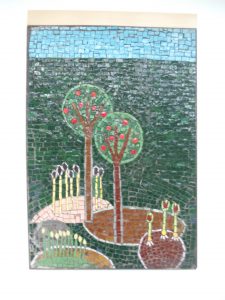 Although the blessing took place during the Lenten season, it equally speaks well to the season of Easter. The Blessing of seeds happened on the Solemnity of St. Benedict (March 21) at Portsmouth Abbey. The blessing was prayed by Prior Michael Brunner before Vespers.
Although the blessing took place during the Lenten season, it equally speaks well to the season of Easter. The Blessing of seeds happened on the Solemnity of St. Benedict (March 21) at Portsmouth Abbey. The blessing was prayed by Prior Michael Brunner before Vespers.
“Truly, truly, I say to you, unless a grain of wheat falls into the earth and dies, it remains alone; but if it dies, it bears much fruit.” (John 12:24).
Before Vespers on Sunday, March 21, Prior Michael blessed seeds and seedlings presented by Brother Benedict Maria and me, destined to be planted here at the Abbey and at Our Lady of Grace Monastery (North Guilford, CT), a monastery of contemplative Dominican nuns. These seeds and seedlings provide nourishing food for many. One may ask why the Church blesses seeds before planting. How does this minor rite educate us?
Beginning with the idea of tradition, we can adopt the thinking that is the “principle that ensures the continuity and identity of the same attitude through successive generations…. Tradition is memory, and memory enriches experiences” (Yves Congar, The Meaning of Tradition, San Francisco, Ignatius Press, 2004, 2). As professed monks and oblates, we know from experience that the monastic tradition is a distinct ecclesial identity rooted and sustained in the local traditions of a community’s relationship with a people, a piece of land, and particular circumstances. Further, monks, nuns and oblates will persuasively argue that the monastic way of life is a particular “memory of the Gospels.”
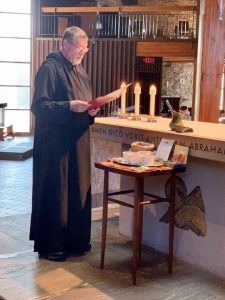 What is discerned by the blessing that Prior Michael imparted is the tradition — the memory — that seeds and seedlings contain: there is a relationship with the Lord of Life, that the serious work of gardening and agriculture is Eucharistic (“Unless a grain of wheat falls into the earth and dies…”), that with the Lord’s blessing we deepen our responsibility of being good stewards of the land and that we attend, and to our identity to co-create with God always pointing to the source of life. Seeds are symbolic of Divine generativity. One of the prayers we hear of Moses saying: “Tell the children of Israel … they are to offer the first-fruits to the priests, and they shall be blessed.” We also hear: “Let neither drought nor flood destroy them, but keep them unharmed until they reach their full growth and produce an abundant harvest for the service of body and soul.” In the second prayer the priest prays, he uses an image of God as the, “sower and tiller of the heavenly word, who cultivate the field of our hearts with heavenly tools, hear our prayers and pour out abundant blessings upon the fields in which these seeds are to be sown.”
What is discerned by the blessing that Prior Michael imparted is the tradition — the memory — that seeds and seedlings contain: there is a relationship with the Lord of Life, that the serious work of gardening and agriculture is Eucharistic (“Unless a grain of wheat falls into the earth and dies…”), that with the Lord’s blessing we deepen our responsibility of being good stewards of the land and that we attend, and to our identity to co-create with God always pointing to the source of life. Seeds are symbolic of Divine generativity. One of the prayers we hear of Moses saying: “Tell the children of Israel … they are to offer the first-fruits to the priests, and they shall be blessed.” We also hear: “Let neither drought nor flood destroy them, but keep them unharmed until they reach their full growth and produce an abundant harvest for the service of body and soul.” In the second prayer the priest prays, he uses an image of God as the, “sower and tiller of the heavenly word, who cultivate the field of our hearts with heavenly tools, hear our prayers and pour out abundant blessings upon the fields in which these seeds are to be sown.”
Portsmouth Abbey and the Dominican nuns (and their collaborators) recognize that some ancient customs are worth remembering because they help us discern the patterns of grace in reality. This minor rite shows us how we stand in relationship with divine revelation, good human work, leisure and the nourishing of the body. The rite transmits, that is, educates us, in the mercy of of God’s Providential care for all creation.
In another place in the already cited work of Cardinal Congar, he says tradition is, “the environment in which we receive the Christian faith … a living communication whose content is inseparable from the act by which one living person hands it on to another.” On Sunday, March 21, Prior Michael did just that: he took what he received in faith and transmitted to others (Br. Benedict Maria, the assembled monastic community, and me) the gift of life and memory by imparting a blessing upon the seeds and seedlings that will feed human beings and honey bees alike. Far from being superfluous and incidental the blessing is an act of encouragement and joy to attend to God’s creation that’s right in front us with an attitude of hope for the days to come.
Science teaches us at once both the immense vastness of the universe at a macroscopic level — galaxies whose expanse in space generates awe in even the most cynical — as well as the inverse: the billions of cells that make up each individual organism. Together they reveal the vast web of interconnectedness, the foundation of God’s design for a world whose destiny is a living communion held together in love. Each human being, uniquely and through his or her own gifts, becomes part of the story of how this mystery is revealing itself over the steady flow of history. (NS)
The other day I was poking around on the calendar as we were very quickly moving to the end of one civil year and the beginning of another finding that the first day of Spring is 20 March 2021. I have Spring on the brain and with Spring also the gardens and my venerable honey bees. Also in my search I found that the Roman Pontiff, Pope Pius XII, in 1948 issued an address “On Bees.” The papal text was translated by Augustine Klaas, S.J., and he also wrote an introduction.
What has been on my mind for some time is the sacramentality of creation. Some will question this idea but they are the ones with little education which coincides with a lack of integration between the spiritual and natural in Christianity that comes about in the Incarnation. From time immemorial there Mother Church, both East and West, have considered creation as a sacrament. Some Catholic and Orthodox thinkers in recent years have contributed to a body of knowledge that is appreciative of the fact that there is a sacrament connection (integration) of the spiritual and natural.
I have longed said that if you want to be a virtuous person, a person of faith, hope and charity, work with agriculture. You would have to encounter your own virtue or lack of virtue in time (or perhaps pretty quickly). In particular, keep honey bees will be illuminating to faith and reason and human behavior. I came to this conclusion prior to reading the Pope Pius XII but having read the texts for blessing honey bees, hives and new honey from both the Eastern and Western Churches. The Blessing of Bees and honey are posted here on Communio as I am committed to the annual blessing of bees and honey and the rest of our agriculture pursuits.
Here are the two texts.
Introduction
BEES are fascinating little creatures of God. They have always intrigued mankind by their subtle, winning ways, though on occasion some of their ways are less than winning and one is not subtle at all. The observation and study of their structure, habits, spirit of work, organization, and marvelous co-operation, ever interested man even more than their valuable products of honey and wax. Then, too, lessons of wisdom abound in bees.
Who has not delighted in the exact descriptions of the old classic authors? Homer sings of bees which “issuing ever fresh from a hollow rock, fly in clusters on the vernal flowers” (, II, 87). Virgil vividly notes their activity in the early summer fields and meadows, and in the hive, where “the work goes busily forward, and the fragrant honey is redolent of thyme” (, IV, 169). Shakespeare, too, tells of “singing masons building roofs of gold” and of dire punishment meted out by “sad-eyed justice” to the “lazy, yawning drone”.
Holy Scripture, especially the Old Testament, speaks quite often of bees. Dense armies of soldiers are compared to bees (Is. 7:18) chasing man (Deut. 1:44) and surrounding him (Ps. 117:12). “The bee,” says Ecclesiasticus (11:3), “is small among flying things, but her fruit hath the chiefest sweetness.” And an addition to the Septuagint version of Proverbs (6th chapter) commends the bee after the ant: “Go to the ant, O sluggard, and consider her ways, and learn wisdom …. Or go to the bee, and learn how industrious she is, and bow her industry deserves our respect, for kings and the sick make use of the product of her labor for their health. Indeed, she is glorious and desired by all, and though she be frail, she is honored, because she treasures wisdom.”
Honey is often mentioned in Holy Scripture; for instance, Canaan was a land that “floweth with milk and honey” (Ex. 3:8). Honey was a rather essential ingredient of Saint John the Baptist’s diet (Matt. 3:4). I do not know that Holy Scripture anywhere mentions beeswax.
Deborah, the Hebrew word for bee, is an Old Testament feminine name. Rebecca’s nurse bore that name (Gen. 35:8).
The Fathers of the Church draw many lessons from bees. Following in their footsteps, spiritual writers like Saint Francis de Sales and Saint Teresa of Avila see holy wisdom in these tiny humming insects. For example, Saint Teresa says that in the prayer of quiet the will should not chase after the understanding. which now is “merely making itself a nuisance,” but rather enjoy its tranquil union with God and “be as recollected as the wise little bee. For if no bees entered the hive and they all went about trying to bring each other in, there would not be much chance of their making any honey” (, Chapter 15). Elsewhere she asserts that we should sometimes leave off soul-searching, remembering “that the bee is constantly flying about from flower to flower, and in the same way, believe me, the soul must sometimes emerge from self- knowledge and soar aloft in meditation upon the greatness and the majesty of its God” (, I, 2). Again, referring to the humility which must be in souls favored with visions, she avers that “if what should engender humility in the soul, which knows it does not deserve such a favor, makes it proud, it becomes like a spider, which turns all its food into poison, instead of resembling the bee, which turns it into honey” (, Chapter 8).
Of course, the patron of bees is Saint Ambrose, and the reason for it will be found in the breviary in the second nocturne of his feast. Saint Dominic is also spoken of as another patron of the bees, but no one seems to know just why.
The bee comes into the liturgy also: for example, the famous appears in a versicle of Matins for Saint Cecilia’s day: “Busy like a bee, thou didst serve the Lord.” And everyone recalls the “mother bee” of Holy Saturday morning [reference to the line in Exultet].
Granted this age-old tradition, sacred and secular, of seeking wisdom in bees, it is not surprising to find Pius XII discoursing on bees charmingly and instructively. The apiarists of Italy held a national convention in Rome last November, and on the 27th they went in a body to pay their respects to the Pope. In public audience they presented him with gifts, honey and beeswax, the latter probably in the form of candles. The Holy Father graciously replied.
ADDRESS OF PIUS XII
November 27, 1948
Your presence in such large numbers, your desire to assemble before Us, beloved sons, is a real comfort: and so We express our heartfelt gratitude for your homage and your gifts, both particularly pleasing to Us. Beyond its material and technical importance, the work which you represent, by its nature and significance has a psychological, moral, social, and even religious interest of no small value. Have not bees been sung almost universally in the poetry, sacred no less than profane, of all times?
Impelled and guided by instinct, a visible trace and testimony of the unseen wisdom of the Creator, what lessons do not bees give to men, who are, or should be, guided by reason, the living reflection of the divine intellect!
Bees are models of social life and activity, in which each class has its duty to perform and performs it exactly—one is almost tempted to say conscientiously—without envy, without rivalry, in the order and position assigned to each, with care and love. Even the most inexperienced observer of bee culture admires the delicacy and perfection of this work. Unlike the butterfly which flits from flower to flower out of pure caprice; unlike the wasp and the hornet, brutal aggressors, who seem intent on doing only harm with no benefit for anyone, the bee pierces to the very depths of the flower’s calix diligently, adroitly, and so delicately, that once its precious treasure has been gathered, it gently leaves the flowers without having injured in the least the light texture of their garments or caused a single one of their petals the loss of its immaculate freshness.
Then, loaded down with sweet-scented nectar, pollen, and propolis, without capricious gyrations, without lazy delays, swift as an arrow, with precise, unerring, certain flight, it returns to the hive, where valorous work goes on intensely to process the riches so carefully garnered, to produce the wax and the honey. (Virgil, 4, 169.)
Ah, if men could and would listen to the lesson of the bees: if each one knew how to do his daily duty with order and love at the post assigned to him by Providence; if everyone knew how to enjoy, love, and use in the intimate harmony of the domestic hearth the little treasures accumulated away from home during his working day: if men, with delicacy, and to speak humanly, with elegance, and also, to speak as a Christian, with charity in their dealings with their fellow men, would only profit from the truth and the beauty conceived in their minds, from the nobility and goodness carried about in the intimate depths of their hearts, without offending by indiscretion and stupidity, without soiling the purity of their thought and their love, if they only knew how to assimilate without jealousy and pride the riches acquired by contact with their brothers and to develop them in their turn by reflection and the work of their own minds and hearts; if, in a word, they learned to do by intelligence and wisdom what bees do by instinct—how much better the world would be!
Working like bees with order and peace, men would learn to enjoy and have others enjoy the fruit of their labors, the honey and the was, the sweetness and the light in this life here below.
Instead, how often, alas, they spoil the better and more beautiful things by their harshness, violence, and malice: how often they seek and find in every thing only imperfection and evil, and misinterpreting even the most honest intentions, turn goodness into bitterness!
Let them learn therefore to enter with respect, trust, and charity into the minds and hearts of their fellow men discreetly but deeply; then they like the bees will know how to discover in the humblest souls the perfume of nobility and of eminent virtue, sometimes unknown even to those who possess it. They will learn to discern in the depths of the most obtuse intelligence, of the most uneducated persons, in the depths even of the minds of their enemies, at least some trace of healthy judgment, some glimmer of truth and goodness.
As for you, beloved sons, who while bending over your beehives perform with all care the most varied and delicate work for your bees, let your spirits rise in mystic flight to experience the kindness of God, to taste the sweetness of His word and His law (Ps. 18:11; 118: 103), to contemplate the divine light symbolized by the burning flame of the candle, product of the mother bee, as the Church sings in her admirable liturgy of Holy Saturday: (For it is nourished by the melting wax, which the mother bee produced for the substance of this precious light.)
THE IDOLATRY AND SACRILEGE AT THE RECENT SYNOD ON THE AMAZON
I wish to speak to you about recent events in Rome, in connection with the synod—the meeting of bishops—regarding the Amazon region. This synod was summoned in order to address the challenges faced by the Church in the Amazon region, especially those that are connected with the evangelization of the indigenous peoples there. During the synod, images of Pachamama, the earth goddess of the Incas, was displayed and honoured in the Vatican gardens, carried into St. Peter’s Basilica in a canoe, and also displayed in the Church of Santa Maria in Transpontina, next to St. Peter’s. During the ceremony in the Vatican gardens, some (including at least one who was apparently a Franciscan friar) prostrated themselves before the image of the pagan goddess.
These actions so outraged many of the Catholic faithful that, a few days ago, some faithful Catholic young men went into the Church of Santa Maria in Transpontina, collected the images of Pachamama, and threw them into the Tiber river. This action was greeted with rejoicing by many Catholics.
The courageous Bishop Athanasius Schneider from Kazakhstan summed up those events in this way in an open letter:
1. “You shall have no other gods before Me,” says the Lord God, as the first of the commandments (Ex 20:3). Delivered originally to Moses and the Hebrew people, this command remains valid for all people and all times, as God tells us: “You shall not carve idols for yourselves in the shape of anything in the sky above or on the earth below or in the waters beneath the earth; you shall not bow down before them or worship them” (Ex 20:4-5). Our Lord Jesus Christ kept this commandment perfectly. When offered the kingdoms of the world if only he would bow to the devil, Jesus responded, “Begone, Satan! for it is written, ‘You shall worship the Lord your God and him only shall you serve’” (Mt 4:10; Dt 6:13-14). The example of Christ therefore is of the utmost importance for all people who desire “the true God and eternal life”; as St. John the Apostle exhorts us: “Little children, keep yourselves from idols” (1 Jn 5:20-21)…
2. On October 4, 2019, on the eve of the Amazon Synod, a religious ceremony was held in the Vatican gardens, in the presence of Pope Francis and of several bishops and cardinals, which was led partly by shamans and in which symbolic objects were used; namely, a wooden sculpture of an unclothed pregnant woman. These representations are known and belong to indigenous rituals of Amazonian tribes, and specifically to the worship of the so-called Mother Earth, the Pachamama. In the following days the wooden naked female figures were also venerated in St. Peter’s Basilica in front of the Tomb of St. Peter. Pope Francis also greeted two bishops carrying the Pachamama object on their shoulders processing it into the Synod Hall where it was set in a place of honor. Pachamama statues were also put on display in the church of Santa Maria in Traspontina.
Objective sources note that the Pachamama is an object of veneration, a goddess to which some Bolivians sacrifice llamas, an earth deity worshipped by some Peruvians, rooted in pagan Incan beliefs and practices.
3. Catholics cannot accept any pagan worship, nor any syncretism [mixing of religions] between pagan beliefs and practices and those of the Catholic Church. The acts of worship of kindling a light, of bowing, of prostrating or profoundly bowing to the ground and dancing before an unclothed female statue, which represents neither Our Lady nor a canonized saint of the Church, violates the first Commandments of God: “You shall have no other gods before Me” and the explicit prohibition of God, who commands: “Beware lest you lift up your eyes to heaven, and when you see the sun and the moon and the stars, all the host of heaven, you be drawn away and worship them and serve them, things which the Lord your God has allotted to all the peoples under the whole heaven” (Dt 4:19), and: “You shall make for yourselves no idols nor graven image, neither rear you up a standing image, neither shall you set up any image of stone in your land, to bow down unto it: for I am the Lord your God” (Lev 26:1).
The Apostles prohibited even the slightest allusions or ambiguity in regard to acts of venerating idols: “And what agreement has the temple of God with idols?” (2 Cor, 6:15-16), and “Flee from idolatry. The things which the Gentiles sacrifice, they sacrifice to devils, and not to God: and I would not that you should have fellowship with devils. You cannot drink the cup of the Lord, and the cup of devils: you cannot be partakers of the Lord’s table, and of the table of devils. Do we provoke the Lord to jealousy? Are we stronger than he?” (1 Cor 10:16, 21-22).
St. Paul, without doubt, would say to all who actively participated in the acts of veneration of Pachamama statues, which symbolize material or creatural things, these words: “But now, after that you have known God, or rather are known by God: how turn you again to the weak and needy elements, which you desire to serve again?” (Gal 4:9). The pagans, indeed, worshipped the elements as though they were living things. And observing the syncretistic or at least highly ambiguous religious acts in the Vatican’s Garden, in St. Peter’s Basilica and in the church of Santa Maria in Traspontina, St. Paul would say: “They worshipped and served the creature rather than the Creator, who is blessed forever” (Rom 1:25)…
As established by the Second Council of Nicaea, the Church permits the veneration with exterior gestures of worship such as bowing, kissing and blessing, no other symbols, pictures, or statues but “the icons of our Lord God and Savior Jesus Christ, that of our Lady the Theotokos [Mother of God], those of the venerable angels and those of all saintly people. Whenever these representations are contemplated, they will cause those who look at them to commemorate and love their prototype.”
Now it is said that those who bowed down to image of Pachamama were not literally worshiping the wooden statue but rather what it symbolizes—that is, Mother Earth. Well, that is just as unacceptable to us. The earth is God’s creation, but it is not divine. This notion that all is God and God is all is called pantheism. It is incompatible with Christian faith.
In a way, the gods and goddesses of ancient pagan mythology grew out of nature pantheism. The gods and goddesses are just personified aspects of the natural world; or else, the pagan gods are a divinization of the tribe or nation or empire. The reason for the prohibition of idols in the First Commandment is that idolatry confuses God with his created world. To confuse human beings with God’s own nature is the deception that the serpent—Satan himself—insinuated to Eve in the Garden of Eden, when he said, “you will be like God, knowing good and evil” (Gn 3.5).
At the synod, many expressed concern about responsible human stewardship of the natural world. So far, so good: after all, the Lord did tell Adam and Eve to tend the garden, not to abuse it (Gn 1.26). However, the earth is not divine, and we must not worship Mother Nature. To worship the earth or nature is to commit idolatry and is forbidden by the First Commandment.
There are many problems in the Amazon region: ecological damage, conflicts involving the indigenous peoples and business interests and the state, violations of human and political rights. Those require attention; and sometimes the well-being of the indigenous people has been neglected. However, the greatest need of the Amazonion peoples—as of all of us, of all human beings—is to hear and to believe the Gospel of Christ, to be baptized, and to live as his disciples. It is cruelty and injustice to leave the indigenous peoples in the darkness of paganism. If the Apostles had been content for our ancestors to worship the gods and goddesses of nature or of the tribe or the empire, none of us would be Christian today.
If you go back far enough in history, our ancestors were pagans and worshiped the sun and the moon and the stars and Mother Earth. When they became Christians, they were baptized and renounced all of that as the worship of Satan. It is God’s will that the indigenous people of the Amazon, like our own ancestors (wherever they came from and however long ago they were converted), do the same and come to worship only the living God—the Father, Son, and Holy Spirit.
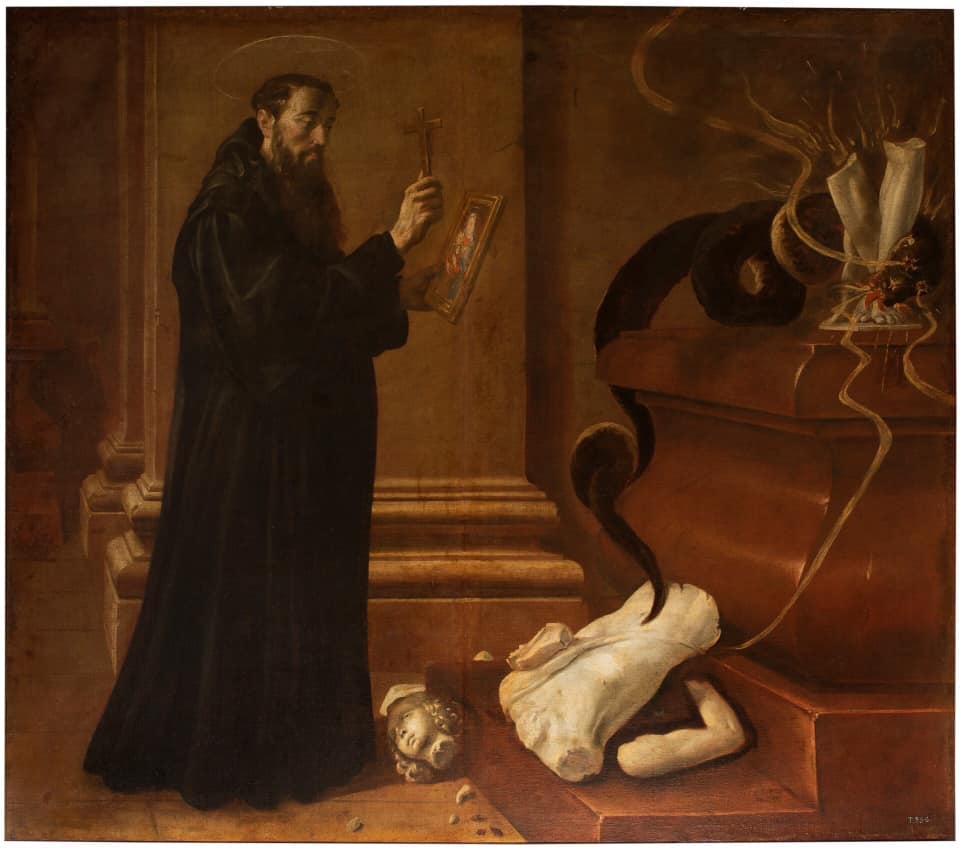 St. Patrick overthrew the idols in Ireland; St. Augustine of Canterbury did the same in Engalnd, when he came to convert the Anglo-Saxons. St. Boniface, when he evangelized Germany, chopped down the sacred oak of the god Thor and used its wood to build a cross and a church. When St. Benedict, the Father of Monks, founded his monastery at Monte Cassino, he destroyed the shrine of Apollo and the sacred grove of Venus and built shrines to St. John the Baptist and St. Martin of Tours.
St. Patrick overthrew the idols in Ireland; St. Augustine of Canterbury did the same in Engalnd, when he came to convert the Anglo-Saxons. St. Boniface, when he evangelized Germany, chopped down the sacred oak of the god Thor and used its wood to build a cross and a church. When St. Benedict, the Father of Monks, founded his monastery at Monte Cassino, he destroyed the shrine of Apollo and the sacred grove of Venus and built shrines to St. John the Baptist and St. Martin of Tours.
Many people forget that the pagan religions were often filled with fear and superstition and sometimes with terrible practices, such as human sacrifice and infanticide and tribal warfare. That is how it was in large parts of the New World when the Spanish and Portuguese and French missionaries came.
Think of Mexico. The Aztecs thought that if they did not feed their gods with human blood, the whole cosmos would die and would be plunged into darkness and chaos. In addition, the Aztec empire demanded a huge tribute in slaves and warriors from conquered tribes so that these could be offered in sacrifice on the altars: the mythology was also the legitimation of the subjugation of conquered tribes to the Aztec emperor. The Catholic Christian conversion of the indigenous people ended all that, through the intercession of Mary, as Our Lady of Guadalupe. The demonic dominion of the Aztec gods has come to an end in the triumph of Christ and of his Mother; and this is not the defeat of the Mexican Indians but rather their triumph and new life in the Body of Christ.
That is the gift that we must preserve and hand on to the Amazonian indigenous people and to all of mankind: to bring them into the Kingdom of Christ. If the Pope or the cardinals or the bishops or the priests or the theologians have done wrong, then it is charity to say so and to pray for them the mercy of God, that they may see their error and repent of it. Let us do that today.
Bishop Schneider has composed the following Prayer of Reparation for the sacrilege and idolatry at the Amazon Synod. I ask you to pray it with me.
Most Holy Trinity, Father, Son and Holy Spirit, receive through the hands of the Immaculate Mother of God and Ever Virgin Mary from our contrite heart a sincere act of reparation for the acts of worship of wooden idols and symbols, which occurred in Rome, the Eternal City and the heart of the Catholic world, during the Synod for the Amazon. Pour out in the heart of Our Holy Father Pope Francis, of the Cardinals, of the Bishops, of the priests and lay faithful, your Spirit, who will expel the darkness of their minds, so that they might recognize the impiety of such acts, which offended your Divine majesty and offer to you public and private acts of reparation.
Pour out in all members of the Church the light of the fulness and beauty of the Catholic Faith. Enkindle in them the burning zeal of bringing the salvation of Jesus Christ, true God and true man, to all men, especially to the people in the Amazon region, who still are enslaved in the service of feeble material and perishable things, as they are the deaf and mute symbols and idols of “mother earth”, to all people and especially to the people of the Amazonian tribes, who do not have the liberty of the children of God, and who do not have the unspeakable happiness to know Jesus Christ and to have in Him part in the life of your Divine nature.
Most Holy Trinity, Father, Son and Holy Spirit, you the one true God, besides Whom there is no other god and no salvation, have mercy on your Church. Look especially upon the tears and the contrite and humble sighs of the little ones in the Church, look upon the tears and prayers of the little children, of the adolescents, of young men and young women, of the fathers and mothers of family and also of the true Christian heroes, who in their zeal for your glory and in their love for Mother Church threw in the water the symbols of abomination which defiled her. Have mercy on us: spare us, O Lord, parce Domine, parce Domine! Have mercy on us: Kyrie eleison!
[This homily was recently preached by dear friend and faithful Benedictine monk.]
 Believe in my experience, you will find something more in the forest than in the books. The woods and the rocks will take you to what you cannot learn from any master. Do not you think that you can suck the honey from a stone and oil from the hardest rock? Do no the mountains distill the sweetness? Do not milk and honey flow from hills, and do not valleys contain wheat in abundance?
Believe in my experience, you will find something more in the forest than in the books. The woods and the rocks will take you to what you cannot learn from any master. Do not you think that you can suck the honey from a stone and oil from the hardest rock? Do no the mountains distill the sweetness? Do not milk and honey flow from hills, and do not valleys contain wheat in abundance?
Letter from Bernard of Clairvaux to Abbe Vauclair (12th century).
Rogation Days 2019 are coming… May 27-29.
If you have a farm or extensive vegetable garden, then ask your priest to come and pray the rogation prayers.
Read:
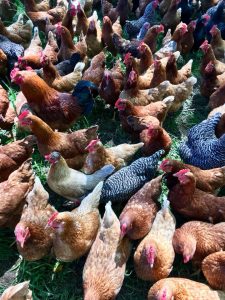 One of my loves is agriculture. Not many would have guessed it. This love has its roots in several places: family, church and the love of food and good health. Catholics and Orthodox Christians have a very long interest in being good stewards of land and water, animals, fish, fowl and agriculture. How we treat these things indicates how we think about ourselves. Neglect and abuse of the land ends badly for everybody. One of the things that I have keenly learned is that too many of have become so disconnected from the land and unconcerned with the quality of our food, the dignity of hard work and the recognition of what we have is given to us as a gift from God.
One of my loves is agriculture. Not many would have guessed it. This love has its roots in several places: family, church and the love of food and good health. Catholics and Orthodox Christians have a very long interest in being good stewards of land and water, animals, fish, fowl and agriculture. How we treat these things indicates how we think about ourselves. Neglect and abuse of the land ends badly for everybody. One of the things that I have keenly learned is that too many of have become so disconnected from the land and unconcerned with the quality of our food, the dignity of hard work and the recognition of what we have is given to us as a gift from God.
Benedict XVI reminded us in Caritas in Veritate:
It is necessary, then, to point in a truly unified way to a new balance between agriculture, industry and services, so that development be sustainable, and no one go without bread and work, and so that air and water and the other primary resources be preserved as universal goods (No. 27).
We need to look at some thinking and experience of farming that only begins to put some things together to as to understand work of faith and ecology. Let me propose “Restoring the Earth” some guiding ideas from Madonna House. We can also call it what Catherine Doherty called, Apostolic Farming.
Just as Pope John Paul gave us a superb theology of the body, we now need to connect that theology with a renewed and robust theology of creation. Many forget that we actually have a theology of creation! This proposal is one that needs to be echoed loudly that shows that farms and farmers incarnate in a particular way God in the world. And because of this fact, we need to be good stewards of the land because God gave us the land and natural resources. Farmers have a vocation that really mirrors the Order of Deacon: a way to serve and feed others.
Indeed, working in the soil is a good you on many levels, not least on the spiritual and affective levels. We know getting out in the fresh air and working is good exercise. Experience tells me that our whole disposition changes for the better. There is a story that when a certain Dominican nun who was having a difficult day with the novices, she would go to the garden in her monastery. Sr. Columba also encouraged the novices to do the same.
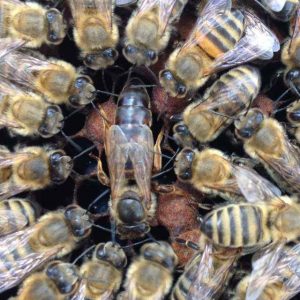 This past week I’ve been settling my commitment to my small agriculture for 2018 with the ordering of some new bee hives, placing an order for new honey bee colonies. This year, I am getting a new species of honey bee from Canada called Saskatraz. This past year I year I had some sort of Russian-mix bee. But I had some issues with the colonies and it’s very possible that only one of three colonies survived.
This past week I’ve been settling my commitment to my small agriculture for 2018 with the ordering of some new bee hives, placing an order for new honey bee colonies. This year, I am getting a new species of honey bee from Canada called Saskatraz. This past year I year I had some sort of Russian-mix bee. But I had some issues with the colonies and it’s very possible that only one of three colonies survived.
I have adopted the motto: save the honey, save the church. You could also replace “church” with “culture” or “the family.”
Committing oneself to the honey bee is a commitment to a 100 million year history of life. The honey bee is one of the most amazing insects God has given us! You can’t underestimate the importance of the honey bee in human and animal life. And yet, we humans are not too aware of our actions that obstruct or even kill the bee due to shallow desires like the eradication of dandelions and white clover. Nevertheless, I am doing my part. I daily pray for my honey bees and I have developed an affection for them.
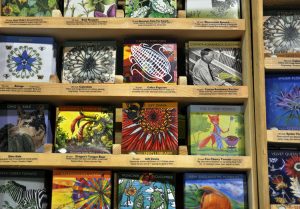 Likewise, I am beginning to organize my mind on what may be planted. With all the seed catalogs I’ve received there is no shortage of ideas; there is a shortage in space and energy to do the work.
Likewise, I am beginning to organize my mind on what may be planted. With all the seed catalogs I’ve received there is no shortage of ideas; there is a shortage in space and energy to do the work.
Back in November 2017 I planted approximately 15 pounds of garlic in the various gardens I oversee.
As a side note, I ran across a CNN article on the papal garden. Now while the Pope says he’s committed to good ecology and the connection with Faith, he doesn’t personally plant and tend the garden on his 62 acre farm. A shame. But the Roman Pontiffs of recent years have had some sort of garden at the summer residence, Castel Gandolfo, just outside of Rome feeding the pope and his guests. Yet, there is a good example set by Pope Francis in is his desire for fresh food. Apparently, he gets a daily basket of fresh produce which may include seasonal items like broccoli and cauliflower but he also gets handmade cheeses, milk, eggs and yogurt are also made fresh each day.
The papal farm has seven farmers and several nuns who make high-quality olive oil cold-pressed by granite stone from a 1000 olive trees (some dating back to AD 1200), 30 cows, and chickens for nutrient dense eggs and meat. Here’s a brief video.
Lots of work to be done in the next 69 days.